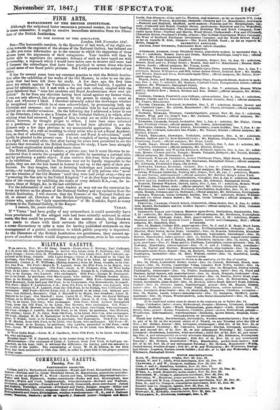FINE ARTS.
MANAGEMENT OF THE BRITISH newrrrttnoN.
Although the subjoined letter recounts a personal matter, its true bearing is more extensive: it ought to receive immediate attention from the Direc- tors of the British Institution.
TO THE EDITOR OF THE SPECTATOR.
London, 18th November 1847. SIR-The honourable mention, in the Spectator of last week, of my slight ser- vices towards the exposure of the abuses of the National Gallery, has induced me to offer you some information as to the manner in which the supporters of those abuses meet the arguments of their antagonists. Your readers will than be better able to appreciate the excessive delicacy of such as have taxed me with personality; a reproach which I would have taken care to deserve still more had I foreseen the subterfuges that have been practised to screen those who have ruined some of our finest public pictures. But I will proceed to the subject of my letter.
It has for several years been my constant practice to visit the British Institu- tion after the exhibition of the works of the Old Masters, in order to see the pic- tures that had been left there for study. A few days ago, the first time since my attack against the Vandalisms in the National Gallery, I applied as usual for admittance; but I met with a fiat and rude refusal, coupled with the gross falsehood that " none but students and Royal Academicians were ever ad- mitted." So far from any objection having been raised against my former visits, Was not only allowed, but even pressed, by the person in charge, to come as often and whenever I liked. I therefore naturally asked the doorkeeper whether be recognized me?-which he at once acknowledged, by pronouncing both my Christian and surname; and he moreover confessed that he had repeatedly ad- mitted me on similar occasions. On the following day I addressed a letter to one of the Directors, (who is also a Trustee of the National Gallery,) in which, after relating what had occurred, I begged of him to send me an order for admission; which, however, he thought proper to refuse. I have been since informed by a gentleman of my acquaintance, that he had been admitted to see the pictures only a few days previous to my unsuccessful application. The exist- ence, therefore, of a rule so insulting to every artist who is not a Royal Academi- cian, as that of admitting "none but students and Royal Academicians," could hardly be pleaded in the present case. I do not complain of having been deprived of a right; but simply state, that after having for years been permitted to see the pictures that remained at the British Institution for study, I have been abruptly and without explanation denied admittance there. The British Institution is, I believe, a private one; but it must likewise be re- membered that it courts the sympathy of the public by assuming a national title, and by professing a public object: it also receives fees from them for admission to its exhibitions. Although its Directors may not be legally responsible to the public, they are not the less bound in honour to act up to the spirit of their pro- fessions. Do they imagine, that in fostering bickenngs and jealousies among artists,-by making invidious distinctions in favour of silly persons who " never saw the beauties of the Old Masters " until they were half swept away,-they are "promoting the fine arts in the United Kingdom"? or do they hope to improve the taste of the country by exhibiting the daubs of every defunct R.A.,-as, for in- stance, those of Bnggs, &c. in the last exhibition ?
For the information of such of your readers as may not see the connexion be- tween my letters on the abuses of the National Gallery and my exclusion from the British Institution, I will observe, that the Trustees of the National Gallery are all, or almost all, Directors of the British Institution; and that the picture- cleaner who, under the " daily superintendence" of Mr. Eastlake, flayed so many pictures in the National Gallery, is the Keeper.
If " Verax " had been guilty of any misconduct, it could assuredly have been proclaimed. If the alleged rule had been actually enforced in other cases, the fact could be proved. But as the matter stands, the Directors are made to share with their servants the odium of having shown a mean discourtesy to spite a man for having published strictures on the management of a public institution in which public property is deposited. As the Directors of the British Institution are gentlemen, they cannot ap- prove of conduct which would disgrace any gentleman, even in his servants.


























 Previous page
Previous page